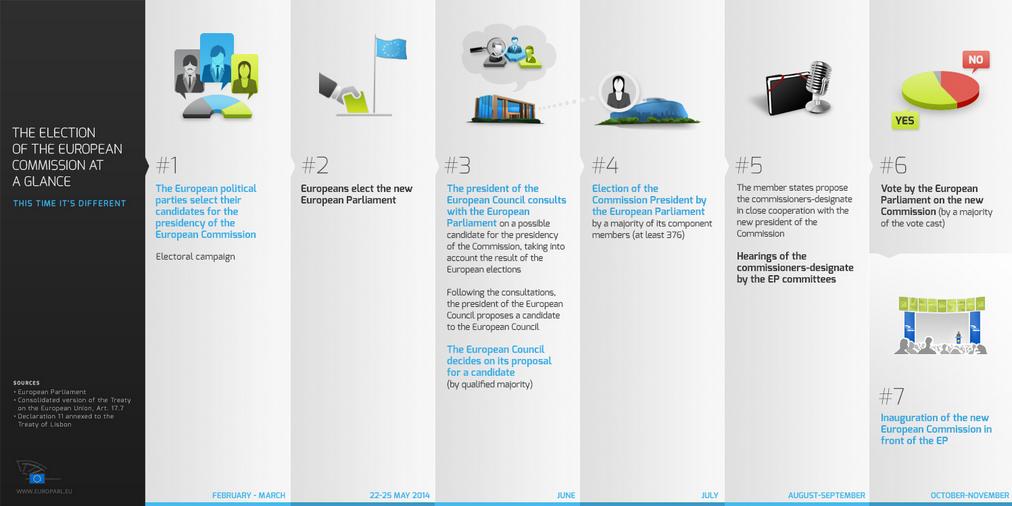In the year of the 100th anniversary of World War I– an event which divided Europe into two blocks and devastated countless cities and villages – European citizens are summoned to vote in elections for the European Union, or at least for the European Parliament (the only EU institution directly elected by the citizens). It is a near-universal trend that at polling time, many voices speak out to highlight and exaggerate the relevance of voting, and at times they manage, at least, to increase the turnout. However, on this occasion, the calls to vote are completely justified.
This time around, the European Parliament elections display a number of curiosities: citizens from 28 member states will participate (after Croatia gained membership last year); a new country, Latvia, has adopted Euro as its official currency (in spite of pressure from some sectors to even make the common currency disappear); and Greece –probably the country in worst shape in the economic crisis– is presiding the Council of the EU during the first semester. In the middle of a crisis of legitimacy, all of the above are signals from the EU emphasizing its progress and stability.
The international organization is obviously not enjoying its best times since its foundation – so why are upcoming elections in May so significant? Here are the main facts to prove the importance of the EU citizens’ votes:
- These elections could be considered the first ones within the economic crisis. Although the last call to vote, in June 2009, was already in the middle of the crisis, people did not know how much it would affect them in the following years and public opinion did not focus much on this issue. In the present day, voters have realised these effects and are trying to find someone to blame for this situation. But there is also a positive side: after several years of concern about public debt problems in the southern countries, there are some signs of recovery and a way out of the crisis, which will probably influence public opinion too.
- Regarding the first point, the crisis has also increased the people’s knowledge about the EU. Citizens know better to what degree EU decisions affect them. That is why it is less likely that high absenteeism will be justified by arguments related to lack of awareness or distance from politics.
- These are also the first elections after the Treaty of Lisbon entered into force, in December 2009. The agreement strengthens the role of the European Parliament (EP): the Council must take its composition into consideration when proposing a new president of the Commission (the EU executive organ), who must later be endorsed by the Parliament. The purpose of this measure was to further democratise the EU. In any case however, the EP is still the weakest entity of the three principal ones (Council, Commission and Parliament).
- The EU’s popularity has fallen last years or, stated differently, euroscepticism has increased in the EU core, mainly due to the economic crisis and an increasing distrust of European treaties and institutions. The economic crisis has spread to political arena. Some political parties have taken advantage of this opportunity, wielding populist slogans, while oddly enough, others – such as the Ukrainians in Kiev’s streets – fight to become EU citizens. The debate here is grounded in the consideration of the EU either as the solution or as the root of the economic problems.
- Among the eurosceptics, there is a large far-right presence in France, the Netherlands and other countries. These political parties aim to enter Parliament in order to stop the integration process from the inside. They have two hard electoral limits ahead: they must achieve at least 25 seats, and those deputies must come from 7 member states or more; moreover, they will have to decide whether they want to form their own group in the chamber.
- Romanians and Bulgarians finally have access to the whole EU labour market, after a seven-year moratorium and despite of the opposition from some sectors.
- This is the first time each political party will present a single candidate for the entire EU (not just national delegates). These candidates will be proposed for the presidency of the European Commission. According to political marketing guidelines, this personalization could mobilize more people to vote.
As a result, in May we can expect to see a Parliament with sharp ideological divisions: the main political parties will lose support, slowing down the debates which, in turn, can be detrimental to economic recovery and structural reforms. Absenteeism will likely be an issue in almost all countries, especially among young voters. It may continue to be as high as in the last decades or, on the contrary, it may decrease as a reaction to the points explained in this article.
[Cover photo: The official EU flag ceremony for the visit of the Italian President, European elections logo in the background – by European Parliament, on Flickr]
This is a non-profit explanation.



![Poster from the 2009 EP election campaign [EP, on Flickr]](https://unitedexplanations.org/english/wp-content/uploads/2014/04/3385587986_5c763609b1_z-300x211.jpg)

![Act-React-Impact - EP 2014 campaign [via Wikimedia Commons]](https://unitedexplanations.org/english/wp-content/uploads/2014/04/Act-React-Impact-300x213.jpg)



